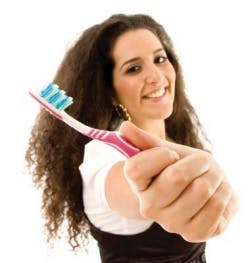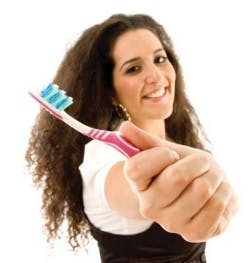Empowering the hygienist
Customize the hygiene appointment for each patient
by Roger P. Levin, DDS
In the battle against caries and periodontal disease, hygienists are on the front lines, delivering outstandingDentists depend heavily on the hygiene department, which often serves as a gateway to the practice for both current and new patients. A quality recare program is critical to retaining patients, attracting new patients, and generating patient referrals. In growing practices, dental hygiene production should account for approximately 25% of practice production.
Historically, the role of the hygienist was to see hygiene patients, perform prophylaxis, take bitewings, apply fluoride, and possibly probe periodontal pockets. Today, dental hygienists can play a much greater role in supporting the practice and educating patients. Hygienists have extensive clinical training to identify potential treatment, make recommendations to the doctor, and educate patients about advancements in dentistry and how the practice can help them achieve better oral health.
Expanding the hygienist's role
The hygienist is the one staff member to whom patients often look for guidance regarding their oral health. An expanded role for the hygienist can lead to more patients staying with the practice and choosing optimal care, improved productivity, and greater fulfillment for the hygienist.
The following steps can help hygienists contribute to a more successful practice:
- Build value for the hygiene appointment.
- Customize the hygiene schedule based on patient needs.
- Educate patients about periodontal health.
- Promote home-care products.
Many patients refer to the hygiene appointment simply as a "cleaning." So do many dentists and hygienists. How does your practice refer to the hygiene appointment? Do staff members call it a "cleaning" or simply "recall"? Neither term is an accurate description. In fact, both devalue what occurs during the hygiene appointment. As you know, prophylaxis isn't the only service hygienists provide. The hygiene appointment can encompass a variety of services, including periodontal probing, oral cancer screening, scaling and root planing, and patient education.
To increase the value of the appointment in the eyes of patients, practices need to rename and rebrand this critical oral health service. Agree now to change your vocabulary, and so will your patients! Some suggestions include hygiene maintenance and oral cancer exam; periodontal maintenance and oral cancer exam; hygiene recare appointment and oral cancer exam; and continuing periodontal care and oral cancer screening.
For years, the typical hygiene appointment was 45 minutes, regardless of patient needs. Today, practices need to customize the hygiene appointments based on the unique needs of each patient. Using 10-minute scheduling units, the practice can now comfortably accommodate: 30-minute appointments (adults, children, patients with missing teeth); 40-minute appointments (patients with excellent oral health); 50-minute appointments (more time-consuming recare patients, recare visit combined with full series of radiographs); and 60-minute appointments (quadrant of scaling and root planing).
These are simply guidelines. For those who still employ 15-minute units, it may be time to consider creating a more flexible and productive schedule.
In addition, scheduling all recare patients for their next appointment either in the operatory or during checkout helps ensure they remain active patients. Patient retention is critical to a practice's continued success. Use appropriate scripts to build value for each appointment throughout the entire patient experience.
Educate patients about periodontal health
Periodontal disease is at epidemic levels. According to the National Institute of Dental and Craniofacial Research, approximately 80% of the population has gingival or periodontal disease. Most patients are unaware of periodontal disease due to its often painless nature. Even when it is detected, patients often turn down recommended treatment because they are not in pain or discomfort.
The solution is an expanded effort to educate all patients about the effects of periodontal disease. Recent studies show links between periodontal disease and other systemic conditions, including coronary artery disease, diabetes complications, and lower birth weights for newborns. The hygienist should be the point person for the practice's efforts to fully educate patients about their oral health. As soon as patients understand that untreated periodontal disease may have repercussions on their overall health, they become tremendously interested in the conversation. Periodontal probing, coupled with education, ensures patients have the best information about their periodontal health.
Promote home-care products in the practice
Improved oral health starts at home. Fortunately, there are a host of products from dental water jets to power toothbrushes that allow patients to achieve healthier teeth and gums. Practices can provide patients an invaluable service by dispensing appropriate products in the office. Patients look to the hygienist for recommendations on products to make a part of their daily regimen.
One example is the new Waterpik® Water Flosser. In a recent study, the Water Flosser proved to be an excellent home-care device for interdental cleaning. Whether it is being used for general purposes, orthodontics, or implants, the Water Flosser enhances a patient's periodontal and oral health. Based on the reengineered dental hygiene program, not only would every patient be educated about Water Flossers, but also offered the opportunity to purchase one in the practice. By carrying products in the practice, more patients are likely to follow through on home-care recommendations.
Some practices are concerned about how patients will react to being sold something. A simple script such as, "Mrs. Smith, I would like to recommend a home-care regimen that will help to maintain your optimal oral health. You have several areas of your mouth that have been treated with restorations and crowns, and it is critical to maintain these teeth as well as prevent the breakdown of other teeth. The regimen I recommend includes a Water Flosser. By using this technology daily, you will be able to reduce the amount of biofilm in your mouth, giving you the best chance of preventing long-term problems with your gums or teeth. Let me show you how these work ..."
Most patients will not only appreciate the opportunity to improve their oral health, but also enjoy the convenience of purchasing a product in the practice without having to make a second trip to a retail store.
Hygienists play a vital role in practice success. Based on their strong relationships with patients, they can help their practices provide an even higher level of care by increasing awareness of periodontal health and educating patients about better home-care options.
Roger P. Levin, DDS, is chairman and CEO of Levin Group, a leading dental management consulting firm that is dedicated to improving the lives of dentists through a diverse portfolio of lifetime services and solutions. Levin Group may be reached at (888) 973-0000 or www.levingroupgp.com.
Past RDH Issues

